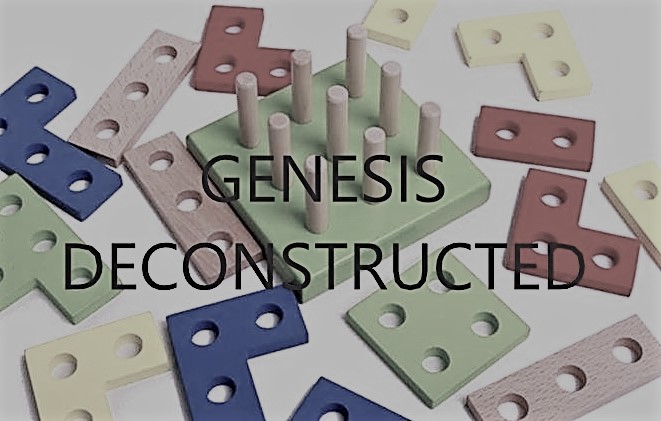The Comparison of the Text and Translation below (due to the size I was only able to add it as downloadable document), is very laborious to prepare, but at the same time it is very satisfying, because it sheds light on the meaning of the text, uncovering the real meaning of Yahweh’s words hidden in the English translation of the Hebrew Bible.
In my original analysis, I picked up on many of the words that are mistranslated in Gen 2:24, but I translated ken כן as ‘thus’, one of the meanings stated in Strong’s Concordance (see Fact #149). I concluded that it was “used of things taking place as God commanded”, because it appeared the case in Genesis 1: 7, 9, 11, 15, 24, & 30. I missed the fact that ken כן means ‘place, station, office’ and ‘upright, honest’ in Fuerst’s Lexicon p. 667 – 8, and did not identify the fact that ken כן is not translated, evidence of a problem with the meaning assigned by Strong’s and/or the translation of the verse.
Taking another look at these verses in Genesis 1, we see from the context that Yahweh gods is dividing, and putting things into their ‘upright place, station, office’. God makes (as עש) the firmament in v. 7, then says (amar אמר) a change in v. 9, 11, 14 – 15, 24, 29 – 30, that in each case ends with “and was upright place (ken כן translated ‘so’)”. In v. 7 ‘space between’ on the second day, v. 9 ‘gathered together . . . place apart’ and v. 11 ‘to kind’ on the third day, v. 14 – 15 ‘space between’ on the fourth day, v. 24 ‘to kind’, then in v. 29 – 30 plants and trees yielding seed to consume in, on the sixth day. This supports that ‘upright station’ is the real meaning of ken כן in Genesis 1.
There are 783 occurrences of ken in the Hebrew Bible, 767 identified as Strong’s 3651 alleged to mean ‘so, thus’, from kuwn that means ‘set upright’, and 16 identified as Strong’s 3653 that mean ‘estate, office, place’, most of which do not mean ‘upright’ because they are used in reference to inanimate objects (Exodus 30:18, 28, 31:9, 35:16, 38:8, 39:39, 40:11, Lev 8:11, and 1 Kings 7:31) or Pharoah (Gen 40:13 & 41:13) who was not ‘upright’. The following examples support that ken means ‘upright station’:
- 22 occurrences of ken are translated ‘correct’ on Shebanq-ancient.data where ‘upright station’ fits the context, as follows:
- In Gen 42:11 ‘upright’ JPS Tanakh 1917 and ‘honest’ in NKJV, 19 ‘upright’ in JPS Tanakh 1917 and ‘true’ in NKJV, 31 ‘upright’ in JPS Tanakh 1917 and ‘honest’ in NKJV, 33 ‘upright’ JPS Tanakh 1917 and ‘honest’ in NKJV, 34 ‘upright’ JPS Tanakh 1917 and ‘true’ in NKJV.
- In Num 27:7 ‘right’ in most translations, 36:5 ‘right’ in JPS Tanakh 1917 and NKJV.
- Joshua 2:4, Judges 12:6,
- 1 Sam 23:17, 2 Kings 7:9, 17:9,
- Job 9:5,
- Psalm 90:12 ‘aright’ in YLT,
- Prov 11:19 ‘rightly’ in Young’s Literal Translation & ‘steadfast’ in JPS Tanakh 1917, 15:7 ‘right’ in YLT, Eccl. 8:10 ‘right’ in JPS Tanakh 1917,
- Jer 8:6 ‘aright’ NKJV, 23:10 ‘right’ NKJV, 48:30 ‘right’ NKJV, & Amos 5:14 ‘upright’ fits the context.
- The text where ken is found is mistranslated, so must be translated one verse at a time to reveal the true meaning. For example,
- In Joel 2:4 “As from inspecting (translated ‘Like the appearance’) mark out (translated ‘of horses’) from examining them (translated ‘their appearance is’) and separate them (translated ‘and like swift steeds’) upright station (translated ‘so’) foundation low land (translated ‘they run’).”
- In Ezra 10:16 “And they destroy (translated ‘and did’) upright station (translated ‘so’) my children (translated ‘the descendants’) . . .”
Translating ken כן as ‘upright station’ in Gen 2:24 reveals the Mighty One will forsake his upright station with the Most High, his covenant with his principal, and his covenant with his people, to become one apart with his Mighty Fire.
There are a few minor differences in the Targum Onkelos, “Most High upright station will forsake Mighty One covenant with rest (not in the Hebrew Bible or Samaritan Targum) of his principal and people and be attached with Mighty Fire and gain by labour (instead of ‘and he shall arise’) in corruption (instead of ‘to utter sounds’) one alone”.
In the Samaritan Targum, the first word is ‘Separated’ instead of ‘Most High’, it says “will rejoice with Mighty Fire’ instead of ‘be attached with Mighty Fire’, and contains ‘from gnashing teeth gain by labour’ before ‘in corruption’.
Now we are ready to compare the text and translation of Genesis 2:25 in the same way.
